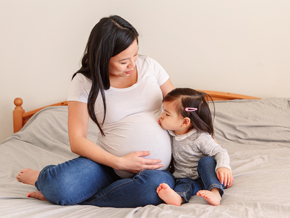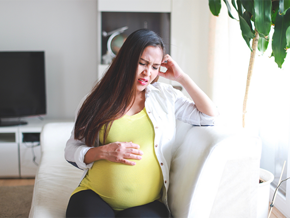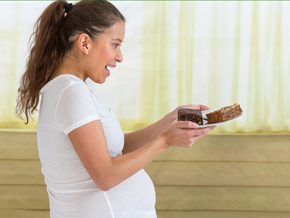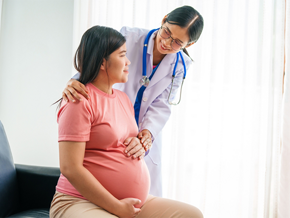
When you’re pregnant, you’re growing a whole human—bones, teeth, organs, and all—in your body. It’s no easy feat, so you need support. Having adequate calcium in pregnancy is more than a nice-to-have; it’s a must-have, a fellow superhero, and not just a sidekick throughout this journey.
Calcium is the building block your baby needs to grow strong bones and a healthy heart. Your baby gets calcium from your body, and if you don't have enough for two people, one of you will end up with a deficit.
Philippine Dietary Reference Intakes (PDRI)—set by the Department of Science and Technology-Food and Nutrition Research Institute (DOST-FNRI)—advises pregnant women aged 19 to 29 to drink around 800 mg of calcium daily, slightly higher than the amount for non-pregnant adults. If you’re a younger mom-to-be, that amount jumps to 1,050 mg per day. Why? Because your own bones are still developing, too.
Learn about the importance of calcium in pregnancy and why you shouldn’t overlook it in your diet.
Role of Calcium in Pregnancy
Let’s break it down further. From pregnancy (and up to the time you’re breastfeeding), your body works overtime to meet the calcium demands of your growing baby. According to a study in Annals of the New York Academy of Sciences, calcium is absorbed more efficiently from your diet and funneled through the placenta to help build your baby’s bones, teeth, heart, and muscles. But your baby’s not the only one affected by the amount of calcium you take (or don’t) during pregnancy. It plays a critical role in the following:
1. Fetal development
First, the most obvious: calcium is vital for building strong bones and teeth in the fetus. It also supports the development of the heart, nerves, and muscles, and ensures a normal heart rhythm and blood-clotting function.
2. Maternal health
Your maternal instinct to protect your baby kicks in before you realize it. Did you know that if you don’t supply enough calcium to the baby in your tummy your body will absorb the calcium from your own bones? This can lead to decreased bone density and increase your risk of osteoporosis later in life.
3. Prevention of pregnancy complications
A 2025 study in Frontiers associated adequate calcium intake with a reduced risk of pregnancy complications such as preeclampsia, a potentially life-threatening condition characterized by high blood pressure and potential damage to other organ systems.
When Should You Start Taking Calcium in Pregnancy?
Calcium is an essential nutrient, whether or not you’re pregnant. After all, it supports strong bones, muscles, and organs. Women, especially, need extra calcium throughout particular stages in life, such as pregnancy, breastfeeding, and after menopause when estrogen levels go haywire.
However, you should ideally start taking calcium as soon as you find out you’re pregnant—or even earlier during your planning phase. Your body begins adjusting right away to support your growing baby, and calcium is one of the nutrients in the highest demand.
In the first trimester, your body ramps up calcium absorption, preparing to support your baby’s developing bones, teeth, heart, muscles, and nervous system. According to the WHO, calcium supplementation is especially recommended from the 20th week of pregnancy onward in populations with low dietary calcium intake to help reduce the risk of complications.
If you’re unsure about what nutrients you need for your pregnancy, talk to your doctor. This way, you know you’re on the right path.
Best Sources of Calcium

Are you lactose-intolerant? You can get your calcium from leafy greens.
People often see "calcium' and think "milk." You’re right, milk is a terrific and easy source of calcium, but you don’t have to rely on dairy alone. Calcium hides out in leafy greens, certain cereals, tofu, and even almonds.
What are pregnancy-friendly, calcium-rich foods?
- Dairy products: stock up on milk, cheese, and yogurt
- Fish with edible bones: add small fish like sardines and anchovies to your diet
- Leafy green vegetables: make sure to get a regular dose of kangkong, kale, spinach, bokchoy, and other greens
- Fortified foods: some cereals and beverages are fortified with calcium
- Nuts and seeds: almonds, sesame, chia, and hazelnuts have ample doses of calcium
- Dried fruits: many dried fruits, like apricots, prunes, and dates make ideal calcium-rich snacks
Mom-to-mom tip? Pair your calcium with vitamin D for better absorption. Think of the latter as the tools to make building your bones more efficient.
Again, don’t forget to consult with your ob-gyn if you have special dietary requirements, a list of foods to avoid, or even if you need to take calcium supplements.
Potential Risks of Calcium Deficiency
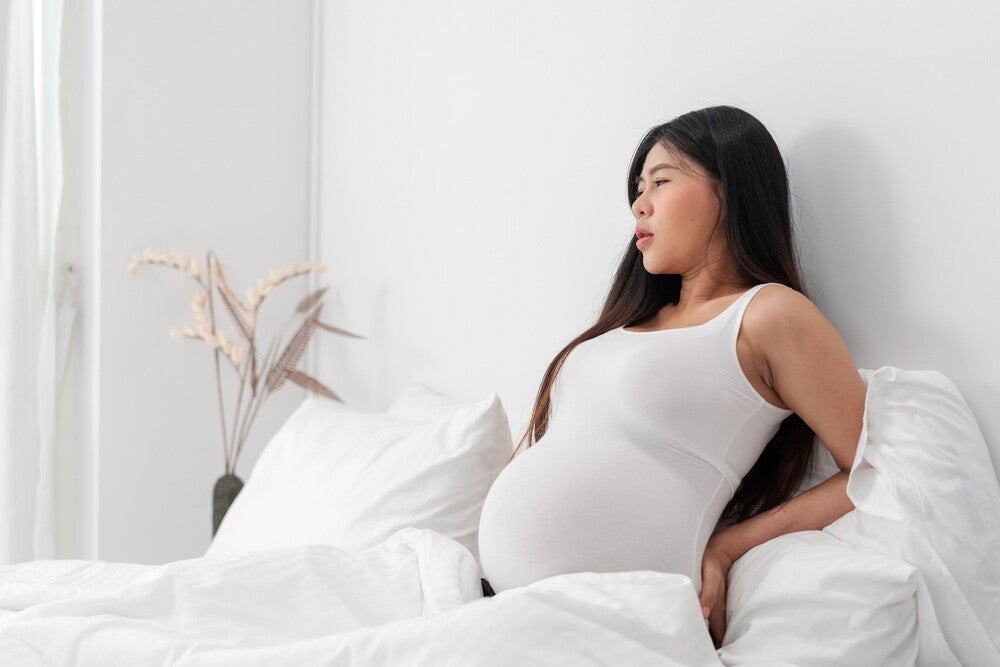
A calcium deficiency doesn’t just mean back pain. It can impact your maternal health as well as your baby’s well-being.
Unfortunately, many Filipinos aren’t getting enough of PDRI’s recommended calcium requirements. In 2015, DOST-FNRI found that 93.2% of pregnant women and 96.5% of lactating mothers don’t take enough calcium. This kind of deficiency can silently chip away at your bones over time, increasing your risk for osteoporosis and other health issues later.
Pregnant women, in particular, are falling short. A local study showed that 66% of expectant mothers in their third trimester weren’t meeting the recommended calcium intake. The current average calcium intake of Filipino pregnant women is 333.1 mg per day. This means most moms are missing out on the calcium needed during one of the most critical times for both mom and baby.
Here are some of the potential risks of not getting enough calcium during pregnancy.
Calcium deficiency risk for moms
1. Osteopenia and osteoporosis
When calcium intake is too low, the body draws from the mother’s bones to support the growing baby. Over time, this can reduce bone mineral density, leading to osteopenia (low bone mass) and eventually osteoporosis, where bones become brittle and more prone to fractures later in life.
2. Preeclampsia and gestational hypertension
Studies, including those supported by the WHO, show that inadequate calcium increases the risk of gestational hypertension and preeclampsia—a potentially life-threatening condition marked by high blood pressure and signs of damage to organs like the liver or kidneys. It can also lead to complicated and premature births. Celebrities like Sam Pinto, Bianca Lapus, and Dianne Medina have had to deal with preeclampsia.
3. Tetany and muscle dysfunction
Severe calcium deficiency can lead to tetany, a condition that causes painful muscle cramps, spasms, or even seizures. Milder deficiencies often result in leg cramps, muscle weakness, or tingling sensations in your hands and feet.
Calcium deficiency risk for babies
1. Intrauterine growth restriction (IUGR)
Calcium is essential for fetal bone development. Inadequate maternal calcium can contribute to IUGR, where the baby doesn’t grow as expected in the womb, potentially leading to low birth weight or developmental delays.
2. Impaired skeletal and dental development
Babies rely on maternal calcium for strong bones and teeth. Deficiency in pregnancy may lead to delayed bone maturation, lower bone density, or poor tooth enamel, increasing the risk for fractures or early tooth decay in childhood.
3. Risk of future bone disorders
Some evidence suggests that babies born to calcium-deficient mothers may be more prone to developing osteopenia or other bone mineralization disorders later in life, especially if their diets remain low in calcium during infancy and adolescence.
Never underestimate the importance of calcium in pregnancy, especially now that you’re aware of the risks and you know where to get your nutrients. To learn more about what food you should be taking for your and your baby’s health, read our article on the principles for eating well during this time. One rule to guide you? Always err on the side of health, future mom!
References
Darwish, A. M., Mohamad, S. N., Al‐Din, H. R. G., Elsayed, Y. A., & Ahmad, S. I. (2008). Prevalence and predictors of deficient dietary calcium intake during the third trimester of pregnancy: The experience of a developing country. Journal of Obstetrics and Gynaecology Research, 35(1), 106–112. https://doi.org/10.1111/j.1447-0756.2008.00879.x
Department of Science & Technology [Food and Nutrition Research Institute]. (2 C.E.). Philippine Dietary Reference Intakes 2015 (Revised September 2018). In https://www.fnri.dost.gov.ph/images/images/news/PDRI-2018.pdf. Retrieved April 30, 2025, from https://www.fnri.dost.gov.ph/index.php/tools-and-standard/philippine-dietary-reference-intakes-pdri
Ian Carl Espinosa, & Ian Carl Espinosa. (2023, November 13). Efforts to boost vitamin K, calcium to combat stunting. SunStar Publishing Inc. https://www.sunstar.com.ph/davao/efforts-to-boost-vitamin-k-calcium-to-combat-stunting
Ibang pagkain na sagana din sa carbohydrates bukod sa kanin, subukan. (2024, June 10). FNRI Website. https://www.fnri.dost.gov.ph/index.php/57b5a22a3lOffbZLAAb10178azs_s/aIYzmjMNiFcj36
Tihtonen, K., Korhonen, P., Isojärvi, J., Ojala, R., Ashorn, U., Ashorn, P., & Tammela, O. (2021). Calcium supplementation during pregnancy and maternal and offspring bone health: a systematic review and meta‐analysis. Annals of the New York Academy of Sciences, 1509(1), 23–36. https://doi.org/10.1111/nyas.14705
WHO recommendation on calcium supplementation before pregnancy for the prevention of pre-eclampsia and its complications. (2020, April 20). World Health Organization. Retrieved April 25, 2025, from https://www.who.int/publications/i/item/9789240003118











